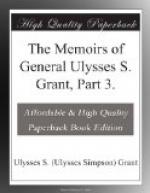We had in this battle about 15,000 men absolutely engaged. This excludes those that did not get up, all of McClernand’s command except Hovey. Our loss was 410 killed, 1,844 wounded and 187 missing. Hovey alone lost 1,200 killed, wounded and missing—more than one-third of his division.
Had McClernand come up with reasonable promptness, or had I known the ground as I did afterwards, I cannot see how Pemberton could have escaped with any organized force. As it was he lost over three thousand killed and wounded and about three thousand captured in battle and in pursuit. Loring’s division, which was the right of Pemberton’s line, was cut off from the retreating army and never got back into Vicksburg. Pemberton himself fell back that night to the Big Black River. His troops did not stop before midnight and many of them left before the general retreat commenced, and no doubt a good part of them returned to their homes. Logan alone captured 1,300 prisoners and eleven guns. Hovey captured 300 under fire and about 700 in all, exclusive of 500 sick and wounded whom he paroled, thus making 1,200.
McPherson joined in the advance as soon as his men could fill their cartridge-boxes, leaving one brigade to guard our wounded. The pursuit was continued as long as it was light enough to see the road. The night of the 16th of May found McPherson’s command bivouacked from two to six miles west of the battlefield, along the line of the road to Vicksburg. Carr and Osterhaus were at Edward’s station, and Blair was about three miles south-east; Hovey remained on the field where his troops had fought so bravely and bled so freely. Much war material abandoned by the enemy was picked up on the battle-field, among it thirty pieces of artillery. I pushed through the advancing column with my staff and kept in advance until after night. Finding ourselves alone we stopped and took possession of a vacant house. As no troops came up we moved back a mile or more until we met the head of the column just going into bivouac on the road. We had no tents, so we occupied the porch of a house which had been taken for a rebel hospital and which was filled with wounded and dying who had been brought from the battle-field we had just left.
While a battle is raging one can see his enemy mowed down by the thousand, or the ten thousand, with great composure; but after the battle these scenes are distressing, and one is naturally disposed to do as much to alleviate the suffering of an enemy as a friend.




